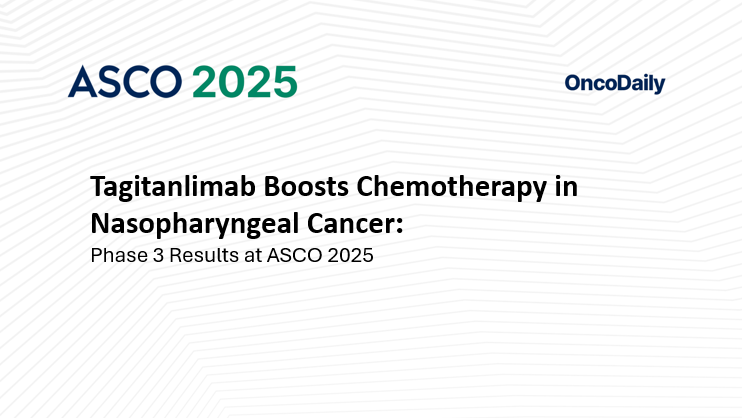What was the Background and Rationale for Tagitanlimab Study?
The addition of PD-L1 inhibitor tagitanlimab (KL-A167) to gemcitabine and cisplatin (GP) chemotherapy showed promising activity as first-line therapy for recurrent/metastatic nasopharyngeal carcinoma (R/M NPC). This randomized phase 3 study (KL167-Ⅲ-08, NCT05294172) compared tagitanlimab plus GP versus placebo plus GP.
How was the Study Designed and who were the Patients?
Eligible patients with previously untreated R/M NPC were randomized 2:1 to receive:
- Tagitanlimab 1200 mg IV on Day 1 plus cisplatin (80 mg/m², Day 1) and gemcitabine (1000 mg/m², Days 1 and 8) every 3 weeks for up to 6 cycles, followed by tagitanlimab monotherapy every 3 weeks;
- Placebo plus the same GP regimen followed by placebo monotherapy.
Patients in the placebo arm could crossover to tagitanlimab monotherapy upon progression. The primary endpoint was progression-free survival (PFS) assessed by blinded independent central review (BICR) per RECIST 1.1.
What were the Key Results of the Trial?
Between June 16, 2022, and May 27, 2023, 295 patients were randomized: 197 to tagitanlimab plus GP and 98 to placebo plus GP. Median age was 52 years; 79.7% were male. As of February 4, 2024, 47.2% of patients in the tagitanlimab arm remained on treatment versus 23.5% in the placebo arm, 36.7% of placebo patients crossed over to tagitanlimab after progression. Median follow-up was 11.7 months.
Efficacy:
- PFS was significantly improved with tagitanlimab plus GP, reducing risk of progression or death by 53% (HR 0.47; 95% CI 0.33–0.66; one-sided P <0.0001).
- Median PFS: Not reached (95% CI 10.9–NE) in tagitanlimab arm vs 7.9 months (95% CI 6.9–8.3) in placebo arm.
- 12-month PFS rate: 56.7% vs 26.7%.
- Objective response rate (ORR) per BICR: 81.7% (95% CI 75.6–86.9) vs 74.5% (95% CI 64.7–82.8).
- Median duration of response (DoR): 11.7 months vs 5.8 months (HR 0.48; 95% CI 0.32–0.70).
- Overall survival (OS) benefit observed (median OS not reached in either arm; HR 0.62; 95% CI 0.32–1.22).
Safety:
Most common ≥ grade 3 treatment-related adverse events: neutrophil count decreased (57.9% vs 49.0%), white blood cell count decreased (52.8% vs 46.9%), anemia (38.6% vs 40.8%). Safety profile was manageable and consistent with previous reports; no new safety signals identified.
What Conclusions were Drawn from the Study?
Tagitanlimab combined with gemcitabine and cisplatin significantly improves progression-free survival compared to chemotherapy alone in first-line treatment of R/M NPC. The regimen has a manageable safety profile and may represent a new standard of care in this setting.
You Can Also Read Advances in Head and Neck Cancer with Dr. Paolo Bossi by OncoDaily
Authors
Yuankai Shi, Hai-Qiang Mai, Chuanben Chen, Ying Wang, Jingao Li, Hekun Jin, Xingchen Peng, Peng Zhang, Shenhong Qu, Jianli Huang, Yu-Xiang He, Dong-Ping Chen, Suming Pan, Jinsheng Hong, Ning Zhang, Feng Lei, Desheng Hu, Yan Qing, Xiaoping Jin, Junyou Ge
Organizations
National Cancer Center/National Clinical Research Center for Cancer/Cancer Hospital, Chinese Academy of Medical Sciences & Peking Union Medical College, Beijing Key Laboratory of Clinical Study on Anticancer Molecular Targeted Drugs, Beijing, China; Sun Yat-sen University Cancer Center, Guangzhou, China; Fujian Cancer Hospital, Fuzhou, China; Chongqing University Cancer Hospital, Chongqing, China; Jiangxi Cancer Hospital, Nanchang, China; Hunan Cancer Hospital, Changsha, China; West China Hospital of Sichuan University, Chengdu, China; Sichuan Cancer Hospital, Chengdu, China; Guangxi Zhuang Autonomous Region People’s Hospital, Nanning, China; Zhangzhou Municipal Hospital of Fujian Province, Zhangzhou, China;
The Second Xiangya Hospital of Central South University, Changsha, China; Affiliated Cancer Hospital and Institute of Guangzhou Medical University, Guangzhou, China; Yuebei People’s Hospital, Shaoguan, China; The First Affiliated Hospital of Fujian Medical University, Fuzhou, China; The First People’s Hospital of Foshan, Foshan, China; Zhongshan City People’s Hospital, Zhongshan, China; Hubei Cancer Hospital, Wuhan, China; Sichuan Kelun-Biotech Biopharmaceutical Co., Ltd., Chengdu, China; Sichuan Kelun-Biotech Biopharmaceutical Co., Ltd./National Engineering Research Center of Targeted Biologics, Chengdu, China.
You Can Also Read Radiotherapy for Head And Neck Cancer: Types, Success Rate, Side Effects And More by Oncodaily
Written by Aharon Tsaturyan, MD


